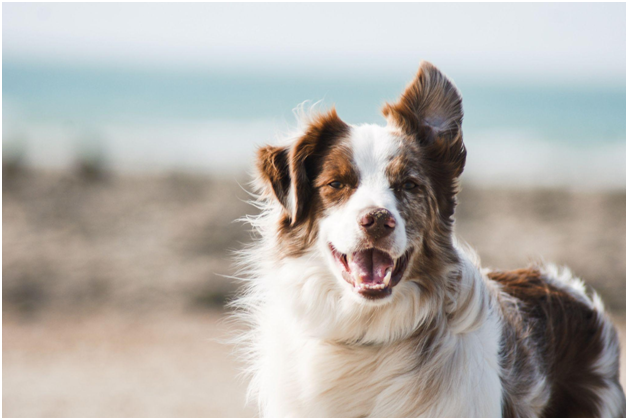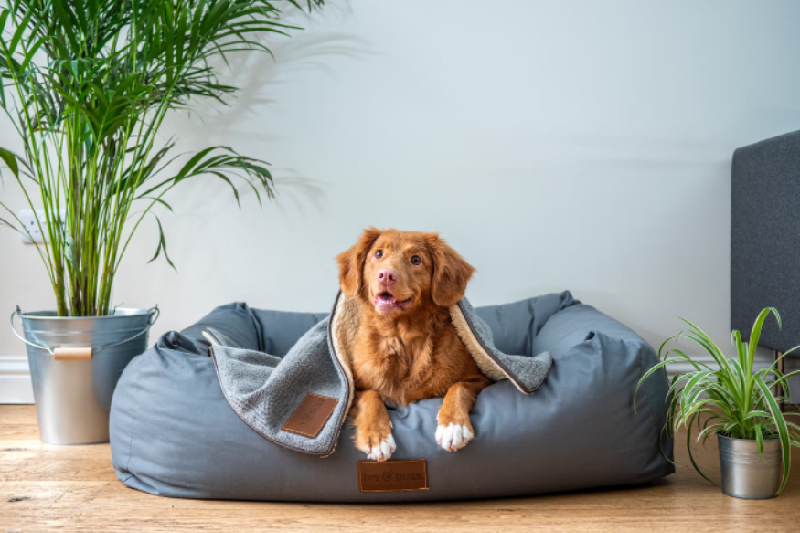Has anyone ever told you it’s a bad idea to have a dog in an apartment? If you’ve been on the receiving end of these “words of caution,” don’t worry! Contrary to popular belief, an apartment can be the perfect home for a dog.
Apartment living with a dog comes with its own set of challenges, but it’s certainly not impossible. As long as you make sure your apartment is a safe place for a dog to live, you’ll have no problem keeping that pup happy and healthy. You may just have to think outside the box when it comes to getting your pup the care and attention they need.
Once you’ve verified that your landlord allows pets (this may require an additional fee), it’s time to prepare your space for your new furry family member! Here are some tips for making sure your dog is properly cared for in a small apartment.
Puppy Proof Your Apartment
Before bringing home a dog, you need to make sure your apartment is safe and ready for a curious dog. Dogs should be able to explore and play freely in their home without the risk of getting injured or accessing something toxic.

Here are some tips for puppy proofing your apartment
- Secure all toxic products. This includes medicine, cleaning supplies, and human food that may be dangerous for dogs. These products should be stored behind closed doors, where curious puppies can’t get to them. If your dog takes medicine, consider storing those meds separately from your own prescriptions. This can help prevent potentially dangerous medicine mix-ups.
- Check your plants and oils. If you have houseplants or use essential oils in the home, make sure they are pet friendly. Certain plants and oils are toxic if ingested by dogs.
- Rearrange your furniture. Make sure there are no small spaces where your dog could squeeze into and get stuck. Push large furniture, like couches and bookshelves, as close to the wall as possible.
- Secure all electrical cords and outlets. Those charging cords may seem harmless enough, but sharp puppy teeth can puncture them easily. Keep all cords secured and out of your dog’s reach to prevent chewing. You may also consider using child-safe outlet covers to keep your pup from shocking themselves.
- Secure all windows and doors. As much as your dog loves being home with you, dogs are curious by nature. Most wouldn’t hesitate to bolt if given the option, and this can be particularly dangerous if you live off the ground floor. Make sure all windows and doors (both the balcony door and the front door) are firmly closed to keep your pup from getting out.
- Give your dog their own space. Creating a safe space for your dog to relax while you’re gone is essential. This could be an appropriately-sized create or a blocked-off area of a room. Somewhere without carpet is best, in case of potty accidents. Giving your pup their own space won’t only keep them from wreaking havoc on your apartment while you’re away—it can also ease their anxiety if they don’t like being alone. Make sure they have a comfortable bed (or some blankets, if they’re prone to ripping up dog beds) and some toys. You should also leave some food and water if you’ll be gone for more than a few hours.
Puppy Potty Breaks in an Apartment
If you’re just moving into your apartment and have the option of choosing which floor you live on, opting for the ground level will make your life much easier! This isn’t always the case, though. Just be prepared to make lots of trips up and down the stairs (or elevator) if you live on an upper floor!
You may also consider setting up an emergency potty on your balcony, if you have one. Patio potties shouldn’t be your dog’s only way to do their business, as regular trips to a real lawn are an important part of house training. But it will come in handy if your dog has to go in the middle of the night or when the weather is bad. (Just make sure the drain is properly set up so your dog doesn’t end up doing their business on the balcony below!)
Getting Enough Physical Activity
If you know anything about dogs, you know they have a lot of energy to expend. This is especially true during the puppy phase! It’s your responsibility as a pet owner to make sure they have a safe and productive means of getting that energy out. Follow these tips to keep your dog from tearing up your carpet or chewing up your shoes when they get bored.
- Go on frequent walks. Get your dog out of the apartment as often as possible to prevent boredom and let them stretch their legs. Most dogs require at least two short walks a day, but this varies depending on their breed, age, and temperament.
- Let them run free. Aim to let your dog run free, AKA off-leash, at least once a day. Find a dog park that’s close by or visit a friend who has a fenced-in yard. Taking regular walks is great, but every now and then a dog just needs to run unrestrained.
- Plan doggie playdates. There’s no better way to wear out your dog than to plan a playdate with other dogs! In addition to being great exercise, your dog will also appreciate the socialization.
- Provide plenty of toys. Prevent boredom by giving your dog lots of chew toys, tennis balls, and squeaky toys to play with while they’re home alone. Dog toys can wear them out both physically and mentally.
- Hire a dog walker. If you’re away from home for most of the day, consider hiring someone to walk your dog while you’re at work. Not only will it give your dog the chance to use the potty during the day, but they’ll also be able to release some of that pent-up energy.
- Take them to doggie daycare. Another option is to sign your dog up for daycare! This is a win-win-win situation. Your dog will get exercise, they’ll get to socialize with other pups, and you won’t have to worry about them chewing on your belongings while you’re at work.
Consider the Breed
If you don’t already have a dog and are considering bringing one home to an apartment, be selective about the breed you choose. Some dogs are better suited to apartment life as compare to others. And believe it or not, the size of the dog doesn’t really matter when it comes to where they live! A Saint Bernard might be more comfortable living in an apartment than a tiny Jack Russell. It just depends on the dog’s energy level.
Research the temperament and activity levels of different dog breeds to find one that will be happy living in smaller quarters.
Protect Your Apartment
The biggest thing to consider when it comes to apartment living is that, in most cases, it’s not your property. If you’re a renter, you want to get your deposit back at the end of the lease. If your dog has ruined the floors or chewed on a few door jambs, chances are your landlord will charge you a hefty fee for cleaning or repairs.
Luckily, there are some easy precautions you can take to minimize the damage done to your apartment unit.
- Put a mat down where they eat. Place a rubber mat under your dog’s food and water bowls to keep the mess contained. Over time, water spills or dog food (especially soft food) can do permanent damage to carpeted or vinyl floors.
- Keep your dog confined while you’re gone. Remember that safe space we mentioned earlier? That’s your best bet when it comes to keeping your dog from damaging your apartment while you’re not home!
- Train out bad behaviors. If your dog is a chewer or likes to scratch on doors to get your attention, you’ll need to train out those behaviors ASAP. If you’ve tried to train your dog to no avail, consider sending your pup to obedience school.
- Keep them occupied. The more things that hold your dog’s attention—think toys and walks—the less likely they are to get bored and damage things in your apartment.
Doggie Behaviors to Consider in an Apartment
Apartment living means you’ll have lots of neighbors living in very close proximity! This means they will hear every noise your dog makes, and your dog will also hear plenty of strange noises themself. There will be lots of cars coming and going, along with people walking outside your front door or across the parking lot.
Apartments are high-traffic areas, and all those strange noises can make a dog anxious. That anxiety can lead to behaviors that you may not experience otherwise. The best way to approach this is to desensitize your dog to the noise. This will require a lot of patience while your dog gets used to it, especially if they aren’t used to living somewhere so busy. Here are some tips for easing your dog into apartment life.
- Start small with introductions. Don’t expect your dog to feel at home right away. You may want to introduce them to your apartment one room at a time, giving them time to adjust. If your dog is extremely anxious, consider keeping them confined to one room (with plenty of trips outside, of course) while they get used to the new sights and smells.
- Keep the blinds open. Your dog will be less likely to bark at random noises if they can see where the sound is coming from. Open the blinds and draw the curtains so your dog can quench their curiosity.
- Conduct meet and greets. You’ll be seeing lots of new people and pets as you travel to and from your apartment. Allow your dog to meet the neighbors whenever possible. Interacting with the people and animals they see most often will help your dog feel more at ease.
- Keep your dog quiet while you’re away. Be considerate of your neighbors by keeping barking to a minimum when you’re not home. If your dog tends to growl or bark at every little noise, use a sound machine or keep the TV on while they’re home alone. That background noise can help drown out any other strange noises.
- Consider obedience class. As we mentioned earlier, if you’ve tried all the tricks and your dog is still exhibiting anxiety or unwanted behaviors, consider calling in the experts.
Put Your Pup’s Health First
No matter where you live, your dog’s overall health should be your main concern. Find a trusted veterinarian and be diligent about getting your dog to their appointments. Keep up with their vaccination schedule and be consistent with administering flea, tick, and heartworm medication. Yes, Lyme disease and heartworms in dogs are still concerns for pets who don’t spend all day running around outside! They actually might be even more of an issue for apartment dogs, as you’ll be living in such close proximity to so many other pets.

